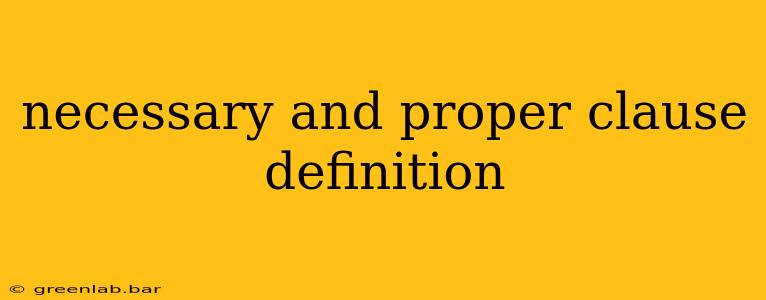The Necessary and Proper Clause, also known as the Elastic Clause, is a crucial part of the United States Constitution. Found in Article I, Section 8, Clause 18, it grants Congress the power "To make all Laws which shall be necessary and proper for carrying into Execution the foregoing Powers, and all other Powers vested by this Constitution in the Government of the United States, or in any Department or Officer thereof." This seemingly simple sentence has been the subject of intense legal and political debate for over two centuries, shaping the very nature of the federal government's power.
Understanding the Clause's Significance
The Necessary and Proper Clause is not a grant of independent power. Instead, it's an enabling clause. It allows Congress to enact laws that are necessary and proper for carrying out its enumerated powers—those explicitly listed in the Constitution, such as the power to tax, regulate commerce, declare war, and raise an army. The clause effectively expands the scope of Congressional authority beyond the explicitly stated powers, providing flexibility to adapt to changing circumstances and unforeseen challenges.
The "Necessary" and "Proper" Debate
The precise meaning of "necessary" and "proper" has been the source of considerable contention. Strict constructionists argue that "necessary" means absolutely essential—only those actions absolutely required to execute an enumerated power are permissible. A broader interpretation, favored by proponents of implied powers, suggests that "necessary" means convenient or useful, allowing Congress more latitude in its legislative actions.
The Supreme Court's interpretation of this clause has evolved over time, significantly shaping the balance of power between the federal and state governments. Landmark cases like McCulloch v. Maryland (1819) have played a pivotal role in clarifying its meaning and application.
McCulloch v. Maryland: A Defining Moment
The landmark case of McCulloch v. Maryland is central to understanding the Necessary and Proper Clause. The case involved the Second Bank of the United States, chartered by Congress. Maryland attempted to tax the bank's operations within the state. The Supreme Court, under Chief Justice John Marshall, ruled against Maryland, establishing several key principles:
-
Implied Powers: The Court affirmed that Congress possessed implied powers beyond its explicitly enumerated powers, based on the Necessary and Proper Clause. The creation of a national bank, while not explicitly mentioned in the Constitution, was deemed necessary and proper for executing Congress's power to tax, borrow money, and regulate commerce.
-
National Supremacy: The Court asserted the supremacy of federal law over state law when operating within the scope of the Constitution. Maryland's attempt to tax the national bank was deemed unconstitutional because it interfered with the federal government's legitimate exercise of its powers.
Implications and Modern Applications
The Necessary and Proper Clause continues to be relevant in modern legal and political discourse. It underpins numerous federal laws and regulations, impacting areas such as:
-
Environmental Protection: Congress utilizes this clause to justify environmental regulations based on its power to regulate commerce and protect general welfare.
-
Financial Regulation: The creation and oversight of agencies like the Securities and Exchange Commission (SEC) rely heavily on the implied powers granted by this clause.
-
National Security: Measures to combat terrorism and protect national security often draw upon the broad interpretation of the clause.
Conclusion: A Flexible and Powerful Tool
The Necessary and Proper Clause stands as a testament to the framers' foresight in creating a flexible Constitution capable of adapting to the evolving needs of the nation. While its interpretation has been a source of ongoing debate, its significance in shaping the balance of power within the American system of government remains undeniable. Its flexible nature allows Congress to address contemporary challenges while remaining grounded in the principles enshrined in the Constitution itself. Understanding the Necessary and Proper Clause is crucial for anyone seeking to comprehend the intricacies of American constitutional law and the dynamic relationship between the federal and state governments.

